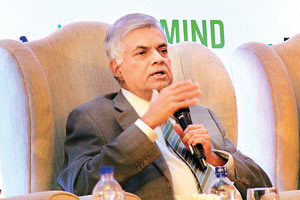Sri Lanka implements 2-pronged strategy for economic prosperity and innovation

Prime Minister Ranil Wickremesinghe
Sri Lanka is to implement a twin strategy based on reconciliation and strengthening democracy to achieve economic prosperity and innovation as it has to catch up several lost opportunities in the past. This was disclosed by Prime Minister Ranil Wickremesinghe, who participated in a panel discussion at, the 2-day National Summit on Foresight and Innovation for Sustainable Human Development held on Tuesday at the Water’s Edge. “Without reconciliation, the end of the war will never bring peace. We will never be one nation. Without strengthening democracy there will be no free flow of ideas that could lead to innovation,” he said.
The premier pointed out that a national government was formed in the country to meet challenges with consensus among two main political parties. The Premier emphasised the need for Sri Lanka to join the global value chain, and change the country’s economy to become more competitive in the world market. The government is committed to sustainable development as many countries had sacrificed their environment, values and democracy for the sake of economic development, he said adding that a 4-year development plan would be unveiled next month.
The plan is focused on speedy sustainable development to improve the living standards of the people and harness Sri Lanka’s strategic location and human resources.
The Business Times revealed details of this 4-year development plan in a May 15 exclusive report headlined “Sri Lanka embarks on new development strategy and matrix”. This master plan on a new development strategy and development matrix will see the country revamp and rejuvenate nine key sectors. They are tourism, digital economy, mega-polis development, Kandy city development, public private partnership for job market training, power and energy, rural sector development, agriculture and investment promotion. The Prime Minister stressed the need to strengthen economic cooperation world wide through free trade agreements and economic partnerships.
Sri Lanka has maintained trade relations with the world since ancient times but to trade with the world today the country should have an edge in a competitive market system, he pointed out. “First we need to move in and ensure we have a sufficient number of FTAs which will enable you to deal with a large number of countries. We need to focus on economic and trade cooperation from Europe to Japan, including India, China, Malaysia, Indonesia, Thailand and Korea.” He disclosed that the country will also enter into a trade agreement with the US but this matter would be decided only after November 2016.
Sri Lanka’s greatest capital is its human resources and it is essential to build on this resource and skills, he said adding that a policy for human development, combined with the country’s strategic position, can lead to innovation. The Government’s plan to make Sri Lanka competitive included its ambitious plans to turn the Western Province into a mega city. The aim is to make it a large, livable city in the Indian Ocean, he opined. The Prime Minister said the Western Province Megapolis should not only be the largest city in the Indian Ocean, but should also rank high in sustainable development. “It must be a livable city. In South Asia now many cities are no longer livable,” he asserted.
The country has devised plans for innovation and technology to boost economic growth while striving to modernise the rural economy, the Prime Minister revealed. Mr. Wickremesinghe also emphasised the need to find ways and means to restore the social fabric and build community in the North and East affected by war. The culture in the north is strong enough to rebuild, he said. Several business leaders who attended the summit told the Business Times that the government should form a consortium as a public private partnership to promote innovation and assist young innovators to enter into world market providing them with necessary seed capital as well as marketing support.
The session attended by Prime Minister Wickremesinghe was moderated by UNDP Resident Representative, Peter Batchelor and included Vice President, myForesight Institute, of the Government of Malaysia – Rushdi Abdul Rahim, Director of Mindlab, Government of Denmark – Thomas Prehn, Performance and Social Innovation Lead – eGov Center, Government of Moldova – Cornelia Amihalachioae and Lead, Kolba Lab, UNDP Armenia, Marina Mkhitaryan.


